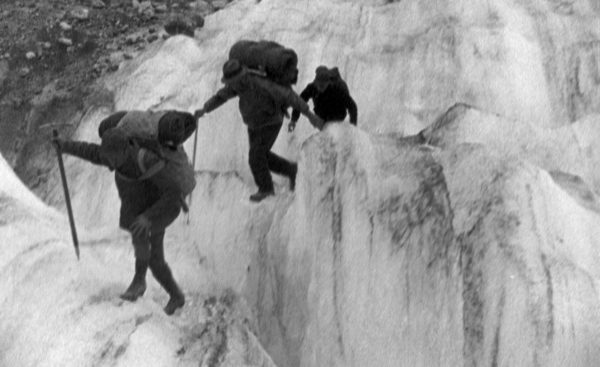

The field of audiovisual archiving and preservation has experienced tremendous technological change over the last thirty years. As digital technology progressively eclipses its analog counterpart, new possibilities for preservation are created, along with new problems. With the decline of analog formats and playback equipment, cultural heritage institutions have struggled to keep up with the pace of this transition. Maintaining and repairing obsolete equipment and access to individuals with specialized technical knowledge are just two of the significant challenges institutions face in relation to the preservation of analog formats. These issues are further inflamed when institutions are under-funded or operate on a lean staff with few resources—which is sadly more often the case than not.
Oral history provides a methodology for recording and disseminating knowledge rooted in the lived experiences, thus we believed that it was ideally suited for preserving the tacit knowledge of our professional community. By preserving anecdotal knowledge and personal experiences of those in the audiovisual archiving community through oral histories, technical knowledge that has historically been excluded from our cultural heritage could finally be captured. With this methodology in mind, in 2021 AMIA submitted a successful grant proposal to the Council on Library and Information Resources (CLIR), with funds provided by the National Film Preservation Board, to conduct interviews with practitioners of increasingly obsolete media.
The Association sought to develop a project that would teach oral history techniques to a cohort of volunteers. AMIA first invited several oral historians, and other archivists who have conducted interviews, to offer training in oral history methodologies and to present on their experiences interviewing practitioners of changing technologies. This cohort of trained volunteers would then be responsible for interviewing at least six archivists and technologists with expertise related to obsolete formats and specialized analog equipment. These interviews were to be researched in advance so they could accurately address the career and personal background of the subject and delve into practical skills involved when working with obsolete media (ex. equipment repair and troubleshooting various playback errors).
This collaborative project between AMIA’s Oral History Committee and the Oral History Association was developed as an online training for conducting the oral interviews in 2022. The training prepared volunteer interviewers for conducting oral interviews and ensured that the interviewer was prepared and able to conduct an interview that can be used as a resource for a broad audience. While this training did not provide formal training, per se, it helped to provide more information and raised the level of awareness for the value of oral history training.
The “Capturing Changing Technologies in Oral Interviews” webinar series began with “How We Did It: Archivists Who Have Interviewed Practitioners of Changing and Obsolete Technologies,” featuring five presentations by archivists who had already conducted such interviews. They explained their more informal processes and what they learned. The panel was then followed by a two-part training course “Doing Oral History.” You can read more about, and view, the webinars on this page.
“The series will teach oral history techniques as well as raise awareness around issues of technology, practice, and sustainability.”
As an outcome of this training, five volunteers conducted seven interviews with technicians, archivists and even media creators from around the world. We thank all of our interviewers for their labor, and interviewees for taking the time to share their respective areas of expertise. Please enjoy the interviews and find them both instructive and entertaining!
Brad McCoy, Audio Preservation Engineer, Library of Congress (Retired) interviewed by Hope O’Keeffe, Senior Associate General Counsel, Library of Congress.
Josef Kloucek, former lab technician and color grader at Synchro Film, Vienna, Austria, interviewed by Janneke van Dalen, film collection manager, Austrian Film Museum.
Josef Kloucek, ehemaliger Kopiermeister und Lichtbestimmer bei Synchro Film, Wien, Österreich, interviewt von Janneke van Dalen, co-Leiterin der Filmsammlung, Österreichisches FIlmmuseum.
James Snyder, Senior Systems Administrator, Library of Congress, National Audio Visual Conservation Center, interviewed by Hope O’Keeffe, Senior Associate General Counsel, Library of Congress, assisted by Aaron Horowitz, Good Peeples Studios.
Eduardo Ancel, Independent Audiovisual Creator and Technical Engineer, interviewed by Allie DaSilva Srulowitz, Senior Audiovisual Preservation Specialist, assisted by Eugenio Amen, Archivist, Corporación Nacional para el Desarrollo (Uruguay).
Eduardo Ancel, Creador Audiovisual Independiente e Ingeniero Técnico, entrevistado por Allie DaSilva Srulowitz, Especialista Senior en Preservación Audiovisual, Biblioteca de UCLA, asistido por Eugenio Amen, Archivist, Corporación Nacional para el Desarrollo (Uruguay).
David Gibson, Digital Project Coordinator for The Recorded Sound Division, Library of Congress, National Audio Visual Conservation Center, interviewed by Hope O’Keeffe, Senior Associate General Counsel, Library of Congress, assisted by Aaron Horowitz, Good Peeples Studios.
Jim McQuaid, filmmaker, oral historian, and founder of Turnip Films, interviewed by Melissa Dollman, Archivist, Tribesourcing Southwest Film and co-founder, Deserted Films.
Doug Solis, Owner of Bigfoot Mobile Systems, Inc., interviewed by Jackie Jay, Audiovisual Archivist and Educator, Owner of Farallon Archival Consulting LLC.
Series editor: Jeff McCarty; Project manager: Melissa Dollman